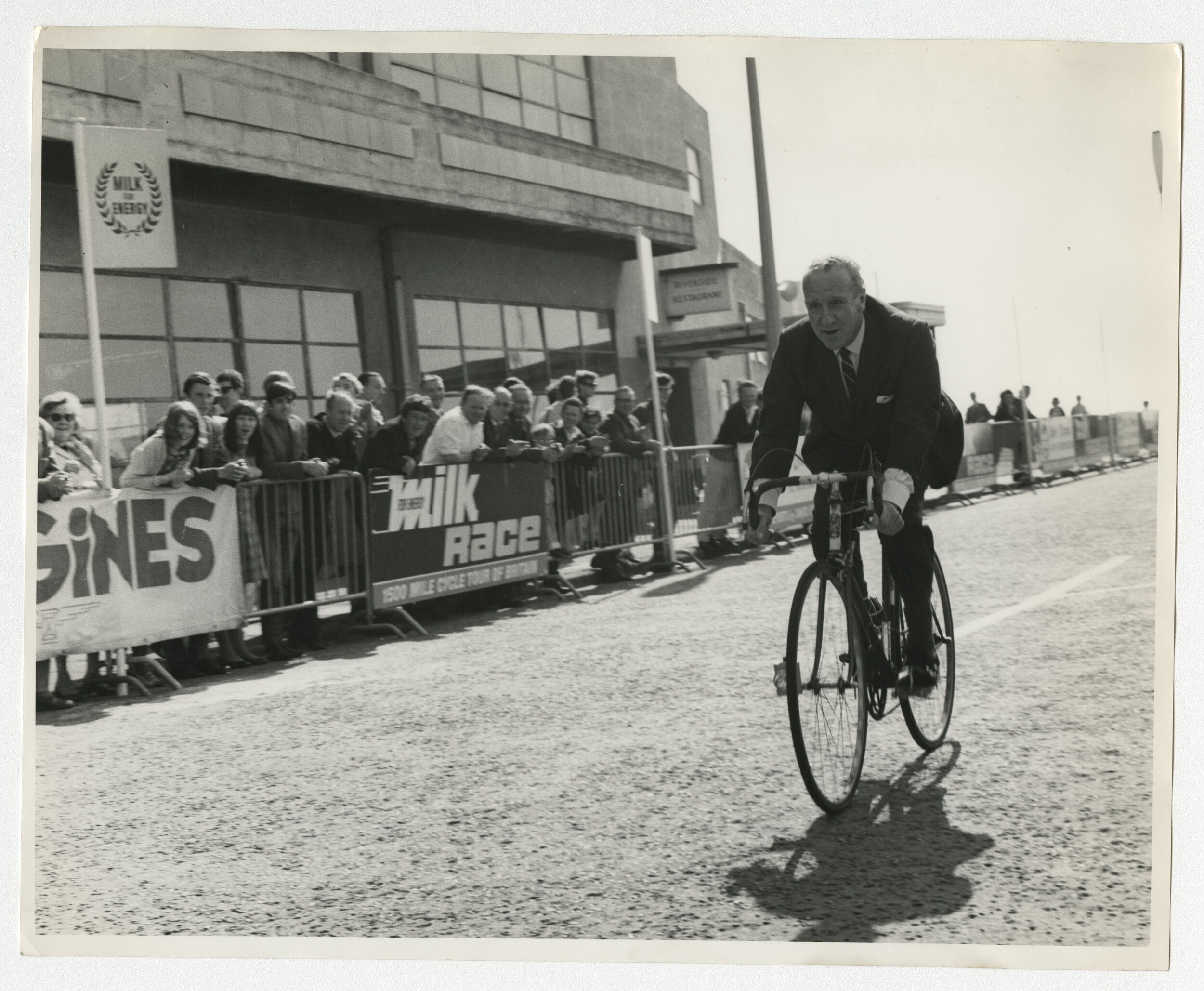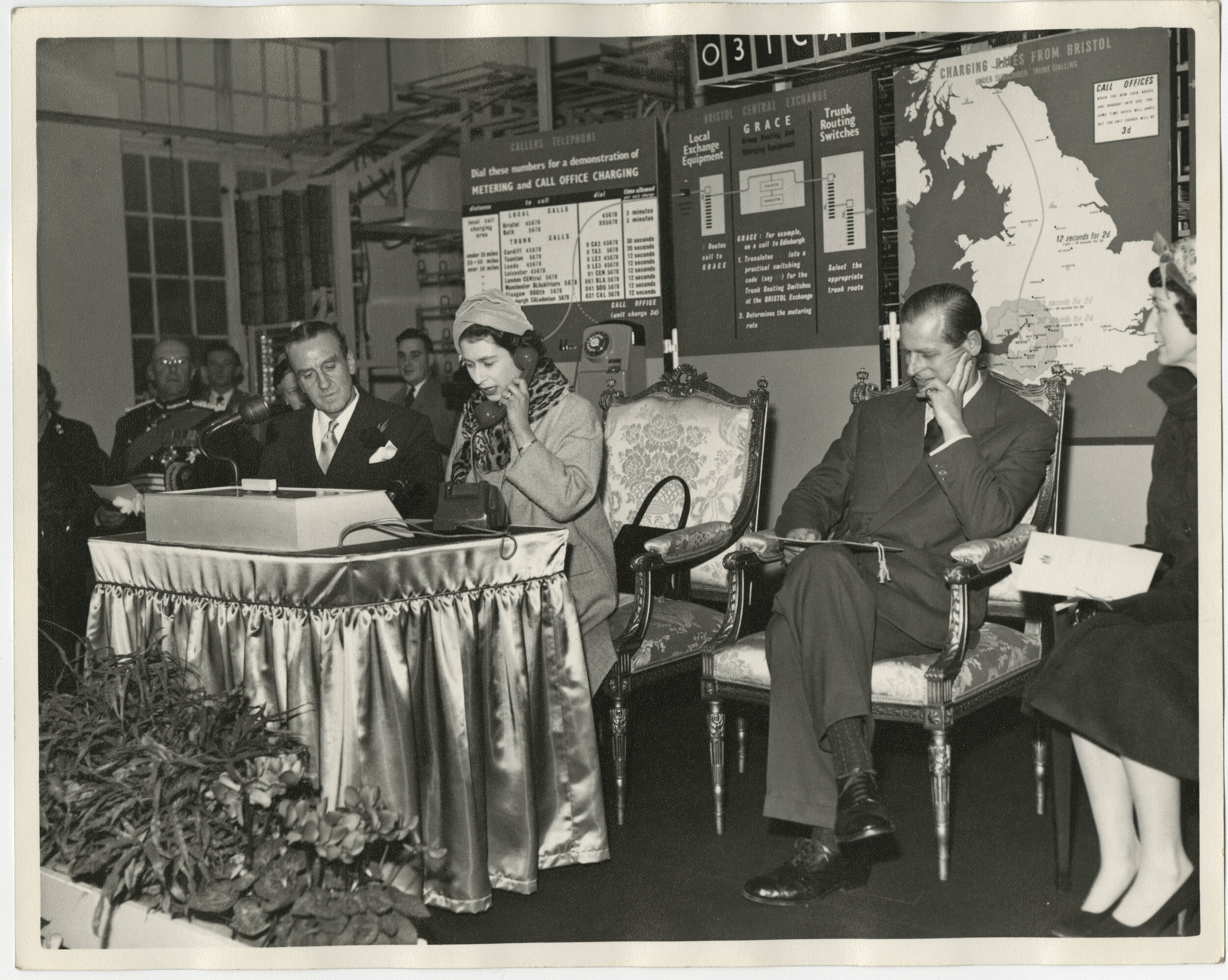
“Marples Must Go!”
The controversial life and career of Ernest Marples.
“Marples Must GO!” was the slogan emblazoned across a bridge spanning the newly built stretch of motorway near Luton. Marples was despised by many motorists during his tenure as Minister for Transport but following a string of subsequent unpopular Labour ministers, public opinion had dramatically shifted! (The Papers of Ernest Marples, MPLS 1/3/4)
Alfred “Ernest” Marples (1907 - 1978) is the figure behind our latest collection to be catalogued and opened to researchers in our reading rooms. Marples was a politician and businessman whose role and impact has all too often been overlooked. He was no stranger to controversy, as both his personal life and political career were rocked by scandals in his later years. He was perhaps best remembered (if remembered at all) for drastically cutting the nation’s railway network during his tenure as Minister of Transport (1959-1964). In fact, Marples enjoyed a remarkable political career, one that spanned almost thirty years and had a transformative effect on the landscape and society of modern Britain.
The project to catalogue the Papers of Ernest Marples began in the summer of 2019 and was largely completed by the end of that year. The impetus for the project arose with two authors who proposed to write the very first biography of Ernest Marples. When first deposited at the Churchill Archives Centre in 2016 the Marples collection comprised numerous boxes of assorted papers, photographs and diaries, as well as some audio material. The first stages of the project focused on rationalising the various papers and photographs, categorising and chronologically arranging this material, and ensuring its safe, secure packaging and storage in our archive strong-room.
Following this initial work on the collection, additional material was donated to the Archives Centre in February 2020. This new accession shed light on the earlier periods of Marples’ life and even included several artifacts. The Marples collection is rather unusual when compared with our other holdings due to the significant quantity of photographs. These are a great resource and we hope they will be used by many generations of researchers to come!
Ernest Marples was born in Manchester in 1907 to a modest working class family. He performed well at school and won a scholarship to Stretford Grammar school. Marples went on to qualify as a Chartered Accountant and moved to London, where he made a living converting Victorian houses into apartments. Marples met Edna Florence Harwood and the two were married in 1937. This marriage however, was not to last and was dissolved only eight years later.
During the Second World War, Marples was commissioned into the Royal Artillery. He rose to the rank of captain before being medically discharged in 1944. The end of active service appears to have nurtured Marples’ interest and participation in local politics. In the 1945 General Election he stood as the Conservative candidate for the constituency of Wallasey, a seat he retained until his resignation from Parliament in 1974.
By the end of the war, Marples’ business ventures were also looking up and by the late 1940’s he was the director of the construction company, Kirk and Kirk. In 1948, he met like-minded civil engineer, Reginald Ridgway, and the two formed “Marples Rigdway”. This new civil partnership had contracts that included the construction of several power stations and dams across the UK, roads in Ethiopia, and ports in Sudan and Jamaica.
Marples’ first hand experience of the construction industry caught the attention of the Conservative Party leadership. When the party returned to government in 1951, Marples was the ideal choice to assist the Minister for Housing, Harold Macmillan, deliver on his promise of building 300,000 new houses a year. This partnership would develop into a strong and lasting friendship between the two men.
During this time, Marples married for a second time. His new wife, Ruth Dobson, was a former secretary and the two were married in 1956.
When Harold Macmillan became Prime Minister in January 1957, he appointed Marples as Postmaster General. In this role Marples inaugurated the Premium Bond scheme and set about modernising the UK’s postal service and telephone network. During his tenure as Postmaster General (1957-1959), Marples oversaw the trialing of the modern postcode system and the introduction of Subscriber Trunk Dialing, enabling long-range calls to be made across the UK without the need of an operator.
“Marples knew how to get homes built in the 1950s; in the 1960s he ended profligate railway finances. But this success came at huge social cost to rural England and Scotland.”
Publicity poster for Marples’ 1945 election campaign for the constituency of Wallasey, Merseyside. (The Papers of Ernest Marples, MPLS 1/1/2)
Ruth and Ernest Marples were married in 1956. Letters in the archive reveal how the two supported one another during the tough later years of Marples’ life. (The Papers of Ernest Marples, MPLS 3/5/1)

Marples joined the Royal Artillery in 1941 and served for three years before being medically discharged. (The Papers of Ernest Marples, MPLS 3/5/8)

Photo of Marples campaigning in Wallasey for the 1951 General Election. (The Papers of Ernest Marples, MPLS 3/1/4)

Marples demonstrating Subscriber Trunk Dialing (STD) to the Queen and Duke of Edinburgh in December 1958. (The Papers of Ernest Marples, MPLS 3/2/7)
The opening page of the first copy of Beeching’s report “The Reshaping of British Railways” with Marples’ annotations in red. (The Papers of Ernest Marples, MPLS 1/3/2)
In 1959 Marples was appointed as the Minister of Transport which became his most controversial position. In his first year of office, Marples opened the UK’s first stretch of motorway – the M1 from Watford to Rugby. Many more would follow and by the end of his tenure the country was criss-crossed with brand new roads. These massive construction projects were completed by various engineering firms including his own, Marples Ridgway, raising questions of a serious conflict of interests. Perhaps Marples is most infamous for appointing Dr Beeching to British Railways with a brief of devising a profitable railway network. His subsequent report “The Reshaping of British Railways” (commonly referred to as “Beeching’s Axe”) led to drastic cuts across the UK and the dismembering of many of Britain’s local and historic railway lines.
In 1963 Marples found himself embroiled in another controversy. Following the scandalous “Profumo Affair”, Marples was caught up in the investigations which aimed to discover any wrongdoings in the upper echelons of the Conservative Party. The collection shows how Marples came under scrutiny for allegedly soliciting prostitutes and reveals the records he kept to make his defence. In 1965, Edward Heath succeeded Macmillan as leader of the Conservative Party and Marples was reassigned to a less prestigious position in the party’s Central Office. When Heath formed his government in 1970, there was no place for Ernest Marples and he was relegated to the backbenches. Marples resigned from Parliament in 1974 and was later awarded a peerage as Baron Marples of Wallasey.
Early in 1975 Marples suddenly and dramatically fled to Monaco as his life in the UK had become increasingly fraught. The previous year he had been arrested for drink-driving and received a fine and a one year driving ban. The irony of course being that he was the Minister of Transport who had introduced these penalties for such dangerous driving. Marples was also facing a string of lawsuits resulting from his various business ventures. At the same time tenants of his London properties were threatening legal action demanding repairs to structural faults.
The final straw came when Inland Revenue ordered Marples to pay almost 30 years’ overdue tax on his London properties. Fearing the substantial fee, Marples fled the country. The Treasury subsequently froze his assets.
Marples spent the remainder of his life between his property in Monte Carlo and his vineyard estate in Fleurie, France. Ernest Marples passed away in July 1978.
Marples was a wine connoisseur and even produced his own wine from his 45-acre vineyard estate in Fleurie, France. In 1974, a fire destroyed Marples’ large wine store in Brixton. This huge loss was yet another reason that prompted Marples’ flight to Monaco. (The Papers of Ernest Marples, MPLS 3/5/4)
“Somehow the name of ‘Beeching’ survived while that of ‘Marples’ faded. I discovered him to be rather impressive – a key figure in the repositioning of the Conservatives as a socially responsive party before 1979”
With thanks to Susan Pynegar for the generous gift of the archive.
And with thanks to Martin Upham for his assistance. “Ernest Marples: the shadow behind Beeching”, by David Brandon and Martin Upham will be published by Pen and Sword in 2022.
If you would like to find out more about the Ernest Marples collection, or have questions about accessing the archive, do get in touch: archives@chu.cam.ac.uk






